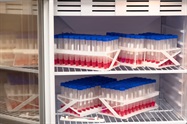
Laboratory and Industrial Refrigeration
Laboratory refrigeration systems provide safe cold storage of critical samples, reagents, blood, plasma, enzymes, vaccines, cell cultures, and patient medication. Lab refrigerators are a step up from your standard household units, however, with features that address sample-damaging temperature variations and unpredictable defrost cycles. Refrigerators are a fixture in most labs, including research, medical, and pharmaceutical facilities.
What are the Different Types of Laboratory Refrigeration Systems?
- A vaccine refrigerator is a specialized refrigeration unit designed to safely store vaccines and other temperature-sensitive medical products at the appropriate temperature range - between 2°C to 8°C (36°F to 46°F). Vaccine refrigerators typically include features such as temperature alarms and a backup power supply to maintain operation during power outages.
- Blood bank refrigerators maintain blood products at proper temperatures (e.g., 4 °C).
- Chromatography refrigerators feature precise temperature control and instrument setup ability within the chamber.
- General-use refrigerators are available in full-size, benchtop, and undercounter configurations.
- Explosion-proof refrigerators, pharmacy units, and combination refrigerator/freezers.
What Are Some Considerations When Choosing a Laboratory Refrigerator?
First, choose the correct size, since a filled unit improves temperature uniformity and reduces heating and cooling cycles. Consider safety alarms, data recorders, and solid versus glass doors. Bottom-mounted evaporative compressors tend to be quieter and save energy.
We're sorry, no matching articles were found. Please select different filter options and try your search again.
By submitting a product review you are not only sharing your experiences with others, but also gaining helpful insight from others in the research community.
Submit a Review